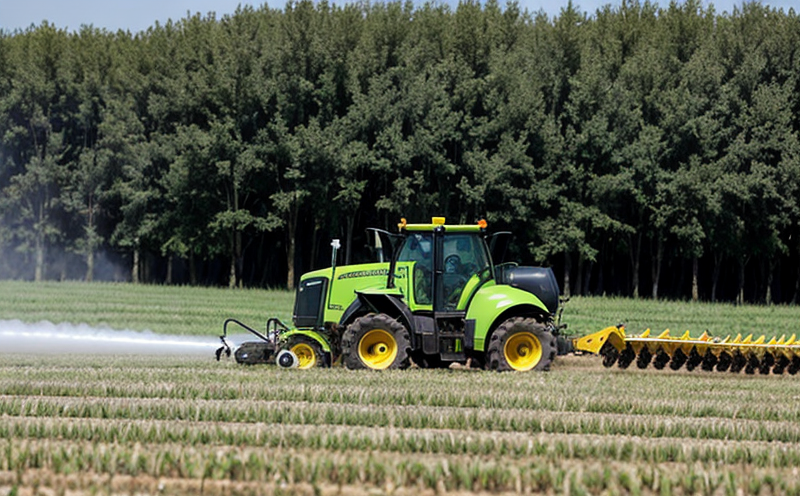Myclobutanil Residue Testing in Crops Validation Method Development Test
The need to ensure food safety and environmental sustainability is more critical than ever. Myclobutanil, a potent fungicide used widely in agriculture to control fungal diseases, can leave residues on crops. These residues must be meticulously tested and validated for compliance with international standards to safeguard human health and the environment.
Our comprehensive validation method development test ensures that crops treated with myclobutanil are free from harmful levels of residues. This service is vital in maintaining regulatory compliance, protecting consumer safety, and upholding the integrity of agricultural products. The process involves advanced analytical techniques tailored to detect even trace amounts of myclobutanil.
The testing method development includes several critical steps: sample preparation, extraction, quantification, and confirmation using validated chromatographic methods. We adhere strictly to international standards such as ISO 3696 for the determination of pesticide residues in foodstuffs and IEC 62471 for safety assessment.
Our laboratory is equipped with state-of-the-art instrumentation that guarantees precision and accuracy. Our team of experts uses their vast experience to ensure that each step of the process adheres to stringent quality control measures. This service provides not only compliance but also peace of mind, ensuring that agricultural products are safe for consumption.
For quality managers, compliance officers, R&D engineers, and procurement professionals, our Myclobutanil Residue Testing in Crops Validation Method Development Test is an indispensable tool. It helps you stay ahead of regulatory changes, maintain a competitive edge, and ensure the highest standards of product quality.
Why It Matters
The importance of residue testing cannot be overstated in agriculture and forestry. Myclobutanil is an effective fungicide that can enhance crop yields but, if not properly managed, it can lead to harmful residues on crops. These residues pose significant risks to both human health and the environment.
- Ensures compliance with international standards like ISO 3696 and IEC 62471
- Safeguards consumer safety by eliminating harmful pesticide residues
- Maintains environmental integrity by preventing overuse or improper handling of pesticides
- Supports regulatory compliance, reducing the risk of legal penalties and reputational damage
- Provides a competitive advantage through consistent product quality
- Aids in research and development to improve crop treatment methods
- Enhances trust with consumers by demonstrating commitment to food safety
By conducting rigorous residue testing, we help our clients stay ahead of regulatory trends and ensure that their products meet the highest standards of quality. This not only protects public health but also supports sustainable agricultural practices.
Benefits
- Elimination of harmful residues on crops, ensuring food safety
- Adherence to international standards, enhancing regulatory compliance
- Maintenance of product quality and reputation among consumers
- Support for sustainable agricultural practices through proper pesticide use
- Reduction in the risk of legal penalties associated with non-compliance
- Enhancement of research capabilities by providing reliable data on residue levels
- Prompt identification and correction of any issues related to pesticide residues
- Building consumer trust and confidence in agricultural products
The benefits extend beyond mere compliance; they contribute to the overall sustainability and safety of the agricultural sector. By mitigating risks associated with myclobutanil residues, we help our clients achieve long-term success in their business operations.
Competitive Advantage and Market Impact
In a competitive market, maintaining product quality is paramount. Our Myclobutanil Residue Testing service provides a significant competitive advantage by ensuring that our clients' products meet the highest standards of safety and compliance.
- Guarantees regulatory compliance with international standards
- Promotes consistent product quality, enhancing brand reputation
- Reduces legal risks associated with non-compliance or consumer complaints
- Sustains trust and loyalty among consumers by demonstrating a commitment to food safety
- Supports sustainable agricultural practices that appeal to eco-conscious consumers
- Facilitates research and development, enabling the introduction of innovative pest control methods
- Aids in maintaining long-term relationships with suppliers and customers through reliable testing services
- Positions clients as leaders in their industry by adhering to stringent quality controls
The market impact is profound. By ensuring that crops treated with myclobutanil are free from harmful residues, we contribute to a safer food supply chain. This not only benefits individual companies but also the broader agricultural sector.





